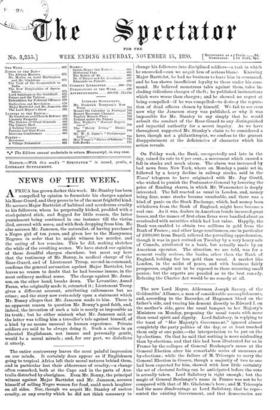On Friday week, the Bank, unexpectedly and late in the
day, raised its rate to 6 per cent., a movement which caused a fall in stocks and much alarm. The alarm was increased by bad news from New York, where on Monday a panic set in, followed by a heavy decline in railway stocks, said in the Times' telegram to have originated with Mr. Jay Gould, who wished to punish the Postmaster-General by lowering the price of Reading shares, in which Mr. Wanamaker is deeply interested. The fall reacted as usual in London, and, money being dear, some stocks became unsaleable, and there was a kind of panic on the Stock Exchange, which, had money been withdrawn from the Bank of England, might have become a real one. As it was, dealers in American bonds incurred great losses, and the names of first-class firms were bandied about as overloaded with securities which had lost value. Happily, the Bank was enabled to obtain two millions in gold from the Bank of France; and other large remittances, one in particular of £600,000 from Brazil, relieved the prevailing apprehension, though it was in part revived on Tuesday by a very heavy sale of Consols, attributed to a bank, but actually made by an American operator. The situation, we are told, was for a moment really serious, the banks, other than the Bank of England, holding far less gold than usual. A market like London, in the midst of peace, and with business fairly prosperous, ought not to be exposed to these recurring small panics ; but the experts are puzzled as to the best remedy. Relaxing the Charter Act would be no remedy at all.


















































